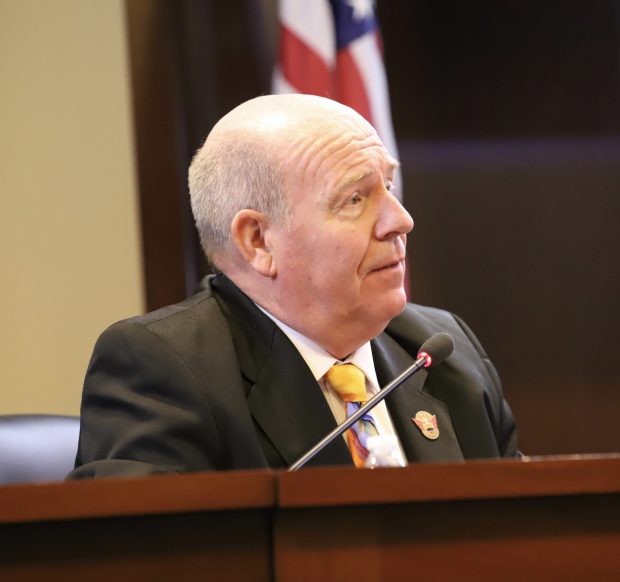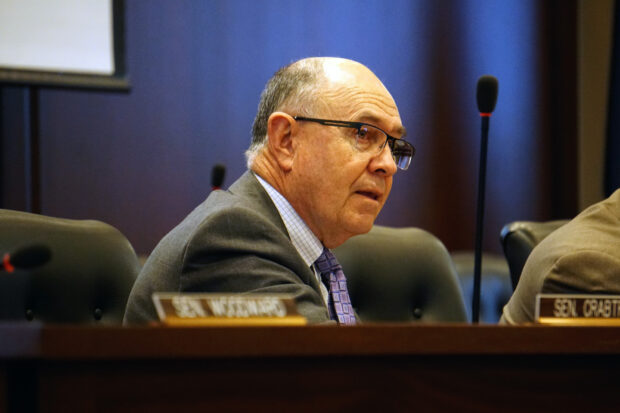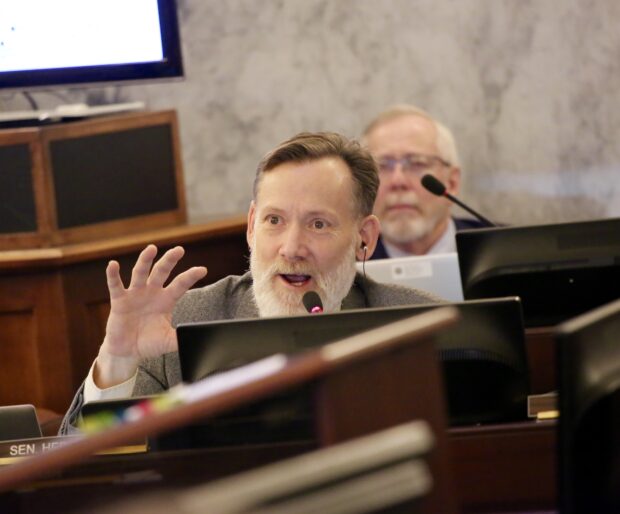(UPDATED, 5:04 p.m., with comment from University of Phoenix.)
If the $685 million University of Phoenix megadeal really died Wednesday, the end of the story was as surprising as its beginning.
Without debate, the Senate rejected a hasty attempt to drag the University of Idaho-Phoenix affiliation out of the ditch.
Supporters saw a path forward. Opponents — a curious mix of hardline Republicans and Democrats — saw a road pocked with potholes. After the 19-14 vote killed Senate Bill 1450, legislative leaders said the Phoenix purchase was also all but dead.
The outcome caught one of the Statehouse’s savviest vote-counters by surprise.

“I thought it would pass the Senate,” said House Speaker Mike Moyle, R-Star, as he milled through Senate chambers minutes after Wednesday afternoon’s vote.
The vote was unexpected, but maybe it shouldn’t have been. Many lawmakers have been frustrated and resentful since May 17, when the U of I and the State Board of Education caught nearly everyone in Idaho off-guard with the Phoenix proposal. Those pent-up feelings certainly factored into Wednesday’s Senate vote — and a vote earlier this month, when the House passed a resolution written not to save the Phoenix deal, but to slow it or kill it.
There’s more to these votes than just bruised egos. Simply stated, the Legislature generally doesn’t make big moves in a big hurry. The U of I and the State Board have touted a transformational transaction to leverage the growing market for online and adult education, reinvent learning opportunities in rural Idaho and generate millions of dollars of new revenue. That lofty rhetoric is probably the very thing that has made some lawmakers skittish.
Pick your favorite big K-12 initiative. Using state dollars to supplement local school construction. Rewriting a 30-year-old funding formula. Moving public dollars into “school choice” programs that support private education. Lawmakers have spent years haggling over all three topics, and they’re not done yet. If anything, this year’s expected $1 billion state investment in school facilities only guarantees that the debate will continue.
Hence the mixed message on Phoenix. Some lawmakers praised C. Scott Green — the Harvard-educated head of an international law firm, who returned to the U of I in 2019 to take the helm as president — for offering an innovative answer to the challenges facing Idaho higher ed. But other lawmakers clearly had no appetite for partnering with a private, for-profit university, especially one with a long and spotty record.
Even so, the last-ditch fix appeared to have early momentum.
On Tuesday morning, the Senate State Affairs Committee eagerly sent SB 1450 to the Senate floor. Boise Democratic Sen. Melissa Wintrow was the lone holdout, saying she was worried that the language of the bill tied the state more closely to the Phoenix purchase, potentially increasing the public risk.
The bill also seemed to have at least one important House ally, Rep. Brent Crane, R-Nampa, the chairman of the House State Affairs Committee and the co-sponsor of the House’s Phoenix resolution. On Monday, Crane told Idaho Education News that SB 1450, at first glance, appeared to address many of his concerns. (The other co-sponsor of the resolution, Rep. John Gannon, D-Boise, was not sold, pointing out that SB 1450 would have left the state liable for any federal writeoffs of Phoenix student loans.)
Along the way, new constitutional and legal questions cemented Senate opposition.
On the eve of the Senate’s vote, Attorney General Raúl Labrador’s chief deputy and state Treasurer Julie Ellsworth each poked holes in SB 1450. Ellsworth, a conservative Republican, raised similar concerns similar to Wintrow’s — illustrating the odd coalition that coalesced around the issue.

The letters from Labrador’s office and Ellsworth swayed the Senate, said President Pro Tem Chuck Winder, SB 1450’s unsuccessful floor sponsor. “Yesterday, it would have passed fine.”
And after a year-long courtship and more than $11 million in outsourced external review, SB 1450 represented the U of I’s last best shot to rescue the Phoenix deal. “This is their bill, basically,” said Winder, R-Boise.
Phoenix does not sound like it has given up on Idaho. “We value and appreciate the thoughtful work by Idaho legislators to find a solution, and we are optimistic that productive conversations can continue,” spokeswoman Andrea Smiley said late Thursday afternoon.
Similarly, the U of I said Wednesday that it was still exploring its options.
But none seem clear.
Theoretically, the U of I could still proceed with Plan A: forming a nonprofit to assume Phoenix oversight. But within the span of a month, the Legislature has received three legal opinions, including one from Labrador, saying the nonprofit plan was unconstitutional. If the U of I pursued a nonprofit, doubling down on the legal advice it received from its outside counsel, the university would surely face a lawsuit, and the job of selling $685 million in bonds under a legal cloud. “I wouldn’t buy them bonds,” Moyle said.
SB 1450 represented a way around the nonprofit issue. It would have created a quasi-governmental entity, known as an independent public body corporate and politic. There’s a big catch, though. Only the Legislature can create a body corporate and politic. Clearly, that’s not happening.
Winder and other Senate leaders may have been ready to make a late-session charge to save the Phoenix deal. But for many senators, it was too much, too soon. And perhaps, too poorly sold.

“I think (Green’s) background in banking and law, it’s obviously worked very well for the University of Idaho in some ways,” said Sen. Scott Herndon, R-Sagle. “But it’s almost like he still has this mentality of, ‘Let’s do this acquisition, solve this problem.’”
Over the course of 10 months, the U of I and the State Board created their own set of political problems, which came to a head Wednesday afternoon.
“This is a case in point in why you don’t do things without bringing in the Legislature on big deals like this,” Moyle said. “They should have brought them in from the start, they should have let everybody know what was going on.”
If the Phoenix deal died Wednesday, it didn’t die suddenly.
Kevin Richert writes a weekly analysis on education policy and education politics. Look for his stories each Thursday.
Click here for our exclusive, in-depth coverage of the Phoenix proposal.
